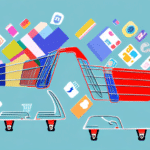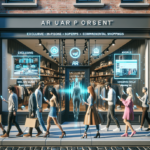The Ultimate Guide to Analyzing Millennials' Online Shopping Habits During the Holiday Season
The holiday season remains a pivotal period for retailers, consistently driving significant sales figures. In this comprehensive guide, we delve into millennials' online shopping behaviors during the holiday season, exploring the key factors that influence their purchasing decisions. We will also assess the ongoing impacts of the COVID-19 pandemic on their shopping habits, the surge in mobile commerce, the role of social media, and the most sought-after products of the season.
Analyzing the Record-Breaking Shopping Seasons
Each holiday season presents unique opportunities and challenges for retailers, with recent years showcasing remarkable growth in online sales. According to Statista, U.S. e-commerce sales reached approximately $1.2 trillion in 2023, marking a significant increase from previous years. Millennials have been at the forefront of this surge, leveraging their digital proficiency to enhance their shopping experiences.
Key Factors Driving Holiday Shopping Success
Several elements have contributed to the robust performance of the holiday shopping season:
- Enhanced Digital Infrastructure: Improved e-commerce platforms have made online shopping more accessible and user-friendly.
- Promotional Events: Extended sales events like Black Friday and Cyber Monday continue to attract millions with substantial discounts.
- Omnichannel Strategies: Seamless integration between online and offline channels provides consumers with flexible shopping options.
The Ongoing Impact of COVID-19 on Shopping Behaviors
The COVID-19 pandemic has permanently altered shopping routines, with a lasting shift towards digital commerce. According to a report by the Deloitte Insights, 75% of consumers have increased their online shopping activities since the pandemic began. Millennials, in particular, have adapted swiftly, embracing contactless payments, virtual try-ons, and other innovative shopping solutions.
Emergence and Growth of Buy Online, Pick Up In-Store (BOPIS)
The BOPIS model has gained substantial traction, offering a hybrid shopping experience that combines the convenience of online ordering with the immediacy of in-store pickup. This approach not only reduces delivery times but also drives foot traffic to physical stores. According to Nielsen, BOPIS usage increased by 40% in 2023, reflecting its growing popularity among millennials who seek flexibility and speed.
Enhancing the Customer Experience
In an increasingly competitive market, providing an exceptional customer experience is crucial. This encompasses:
- User-Friendly Websites: Intuitive navigation and fast load times enhance the shopping experience.
- Responsive Customer Service: Quick and effective support builds trust and loyalty.
- Personalized Interactions: Tailored recommendations and personalized marketing resonate more deeply with consumers.
Retailers investing in these areas have observed higher conversion rates and increased customer retention.
Understanding Millennials' Online Shopping Habits
As the largest consumer demographic in the U.S., millennials' shopping habits are pivotal for retailers aiming to capture this market. The holiday season provides an excellent lens through which to examine these behaviors. Key aspects of millennials' online shopping habits include:
The Surge of Mobile Shopping Among Millennials
Millennials' affinity for mobile devices has significantly influenced their shopping patterns. Smartphones facilitate on-the-go shopping, allowing for seamless transactions and real-time updates. A study by PQ Global indicates that mobile commerce accounts for 54% of all e-commerce sales in 2023. Retailers optimizing their mobile platforms are well-positioned to capitalize on this trend.
Influence of Social Media on Shopping Decisions
Social media platforms play a critical role in shaping millennials' purchasing decisions. Influencer endorsements and targeted advertisements on platforms like Instagram and TikTok significantly impact product visibility and desirability. According to eMarketer, influencer marketing generates an average ROI of $6.50 for every dollar spent, making it a vital strategy for reaching millennial consumers.
The Role of Personalization in Millennial Shopping Experiences
Personalization remains a key driver in attracting and retaining millennial customers. Tailored recommendations based on browsing history, purchase patterns, and personalized communication foster a more engaging shopping experience. Research by Forrester found that personalized experiences can drive a 15% increase in sales and enhance customer satisfaction.
Top-Selling Products of the Holiday Season
The holiday season highlights the products that resonate most with millennials. Recent trends indicate a strong preference for:
- Tech Gadgets: Items like wireless earbuds, smartwatches, and the latest smartphones are perennial favorites.
- Fashion and Apparel: Sustainable and ethically produced clothing items, such as eco-friendly sneakers and recycled-material jackets, are highly sought after.
- Home and Personal Care: Products like smart home devices, wellness gadgets, and premium skincare sets rank high among holiday shoppers.
Retailers stocking these categories can expect a significant boost in sales during the holiday season.
Demystifying the Millennial Generation
Understanding millennials beyond stereotypes is essential for effective marketing and product development. This generation values transparency, sustainability, and authenticity, which influence their purchasing decisions.
Dispelling Common Misconceptions About Millennials
Contrary to popular belief, millennials exhibit strong brand loyalty, especially towards brands that align with their values. They are more likely to support companies that demonstrate social responsibility and ethical practices. A survey by
Pew Research Center highlights that 68% of millennials prefer brands that are transparent about their business practices.
Core Values and Priorities of Millennials
Millennials prioritize experiences over material possessions, favoring investments in travel, dining, and other enriching activities. Convenience and efficiency are also paramount, as millennials expect seamless and hassle-free shopping experiences. Additionally, authenticity in brand messaging and a commitment to sustainability are crucial factors that influence their loyalty and engagement.
Moreover, millennials support companies that emphasize employee well-being and promote a healthy work-life balance, reflecting their broader societal values.
Strategies for Capturing the Millennial Market
To effectively engage and retain millennial consumers, retailers should implement strategies that resonate with their values and shopping preferences. Key strategies include:
Leveraging Personalization in Marketing
Personalized marketing efforts can significantly enhance engagement with millennials. Utilizing data analytics and artificial intelligence, retailers can deliver tailored content, product recommendations, and personalized offers that cater to individual preferences. This approach not only improves the shopping experience but also increases the likelihood of repeat purchases.
Harnessing Influencer Marketing
Collaborating with influencers who embody the brand's values can amplify reach and credibility among millennials. Influencers provide authentic endorsements that resonate more effectively than traditional advertising. Identifying and partnering with the right influencers can lead to increased brand awareness and customer loyalty.
Prioritizing Sustainability in Business Practices
Sustainability is a critical consideration for millennials. Retailers that adopt eco-friendly materials, reduce waste, and implement ethical labor practices are more likely to attract and retain millennial customers. Highlighting these initiatives in marketing campaigns can further reinforce a brand's commitment to environmental and social responsibility.
Optimizing Mobile Commerce
With the growing dominance of mobile shopping, optimizing e-commerce platforms for mobile devices is essential. This includes ensuring responsive design, fast loading times, and secure mobile payment options. Additionally, integrating mobile-friendly features such as one-click purchasing and personalized notifications can enhance the overall shopping experience for millennials.
Final Thoughts on the Shopping Season
Lessons Learned from Recent Holiday Seasons
The evolving landscape of online shopping underscores the importance of staying attuned to consumer behaviors and technological advancements. Key takeaways include:
- Embrace Digital Transformation: Investing in robust e-commerce platforms and digital infrastructure is vital for sustained growth.
- Focus on Customer Experience: Prioritizing user-friendly interfaces, personalized interactions, and exceptional customer service can drive loyalty and repeat business.
- Adapt to Changing Consumer Preferences: Flexibility in offering various shopping options, such as BOPIS and contactless delivery, meets the diverse needs of modern consumers.
Furthermore, the integration of advanced technologies like augmented reality and AI-driven personalization will continue to shape the future of online shopping. Retailers that proactively adopt these innovations will be better equipped to meet the expectations of millennial shoppers and maintain a competitive edge in the market.
As the online shopping trend solidifies its presence, it is imperative for retailers to continuously evolve and enhance their digital offerings. By understanding and catering to millennials' unique preferences and values, businesses can unlock significant growth opportunities and achieve long-term success in the ever-changing retail landscape.





















